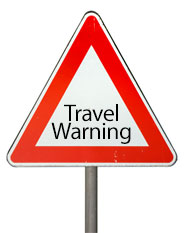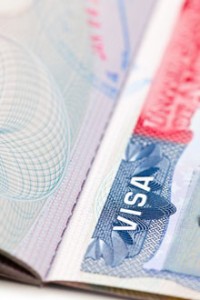 The June 2013 travel warnings are a listing of any warnings that have been posted by the US Department of State in the month of May, warning travelers who plan to visit those countries. Remember to exercise extra care if you are visiting these countries, and check with your travel insurance provider to make sure you still have coverage in place – sometimes coverage can be excluded to countries that are under a travel warning.
The June 2013 travel warnings are a listing of any warnings that have been posted by the US Department of State in the month of May, warning travelers who plan to visit those countries. Remember to exercise extra care if you are visiting these countries, and check with your travel insurance provider to make sure you still have coverage in place – sometimes coverage can be excluded to countries that are under a travel warning.
Countries listed through the month of May 2013 include:
Niger – 29th May 2013
On May 23, 2013, terrorists using suicide car bombs attacked a Nigerien military compound in Agadez and a uranium mining facility, operated by a French company, in Arlit. Therefore, the Department of State warns of the risks of travel to Niger, and urges caution due to these recent attacks in the northern Nigerien towns of Arlit and Agadez. This replaces the Travel Warning for Niger dated January 16, 2013.
Iran – 24th May 2013
Some elements in Iran remain hostile to the United States. As a result, U.S. citizens may be subject to harassment or arrest while traveling or residing in Iran. Since 2009, Iranian authorities have prevented the departure, in some cases for several months, of a number of Iranian-American citizens, including journalists and academics, who traveled to Iran for personal or professional reasons. Therefore, The Department of State warns citizens to carefully consider the risks of travel to Iran and dual national Iranian-American citizens may encounter difficulty in departing Iran. U.S. citizens should also stay current with media coverage of local events and carefully consider nonessential travel. This replaces the Travel Warning for Iran issued December 7, 2012.
Mauritania – 21st May 2013
There is an increased risk for US Citizens traveling to Mauritania, and urges those who travel to Mauritania to exercise extreme caution because of activities by terrorist groups in the region, including al-Qaida in the Islamic Maghreb (AQIM). AQIM continues to demonstrate its intent and ability to conduct attacks against foreign nationals, including U.S. citizens. This replaces the Travel Warning for Mauritania, issued November 30, 2012.
Cote d’Ivoire – 16th May 2013
In April 2013, municipal and regional elections were held and were generally peaceful; however, there were limited and localized incidents of violence in the days following the election, as results were announced. Local security forces responded to these events, which were quickly resolved. However, U.S. citizens who reside in or travel to Cote d’Ivoire should still monitor conditions carefully, maintain situational awareness, and pay very close attention to their personal security. Although the security situation significantly improved in 2013, security conditions can change quickly and without warning. This Travel Warning updates U.S. citizens on the current security situation in Cote d’Ivoire, replacing the Travel Warning of November 16, 2012.
Eritrea – 10th May 2013
The Eritrean government continues to restrict the travel of all foreign nationals. These restrictions require all visitors and residents, including U.S. diplomats, to apply 10 days in advance for permission to travel outside Asmara’s city limits. Permission is rarely granted. As a result, the U.S. Embassy is extremely limited in its ability to provide emergency consular assistance outside of Asmara, and thus warns U.S. citizens of the risks of travel to Eritrea and strongly recommends U.S. citizens defer all travel to the country.
Central African Republic – 10th May 2013
U.S. citizens are warned against all travel to the Central African Republic (CAR) and recommends that those who remain in CAR depart immediately by taking advantage of existing commercial flights. U.S. citizens who have decided to stay in CAR despite this warning should review their personal security situation and seriously consider departing. This replaces the Travel Warning of December 28, 2012, to reflect the lack of security, increased risks in CAR, and the Government of France’s role as the U.S. government’s Protecting Power in CAR while U.S. Embassy operations and services are temporarily suspended.
Libya – 9th May 2013
In early May, the security situation in Tripoli deteriorated when armed groups seized Libyan government buildings in a dispute over a law regarding officials of the former regime. In response, on May 8, the Department of State ordered the departure of a number of U.S. government personnel in Tripoli. Therefore, U.S. citizens are warned of the risks of traveling to Libya and strongly advises against all but essential travel to Tripoli and all travel to Benghazi, Bani Walid, and southern Libya, including border areas and the regions of Sabha and Kufra.
While traveling, please keep these May 2013 travel warnings in mind. Additionally, travelers are advised to enroll through the U.S. Department of State’s Smart Traveler Enrollment Program (STEP) to stay up to date on travel security information.
 We all love international travel, but when you travel abroad for any length of time, knowing what to pack and how much to take can be a daunting task. In most cases, your school or organization you are traveling with should give you some guidance on what you should take and how much – you certainly don’t want to be traveling with 15 suitcases if you are only abroad for a short period of time – and likewise, how do you bring everything if you are going to be abroad for 8 months?
We all love international travel, but when you travel abroad for any length of time, knowing what to pack and how much to take can be a daunting task. In most cases, your school or organization you are traveling with should give you some guidance on what you should take and how much – you certainly don’t want to be traveling with 15 suitcases if you are only abroad for a short period of time – and likewise, how do you bring everything if you are going to be abroad for 8 months?
Knowing this information will help guide you, but that list coupled with our top 5 packing tips will put you in good shape, and it will help you avoid over or under packing:
There are some really good services that will allow you to ship your luggage ahead of time via express courier. With airlines now charging exorbitant fees to bring on your luggage – not to mention excess luggage – shipping your items ahead of schedule could save you a lot of time and hassle! It also allows you to have a fully tracked solution, so the chances of your case going missing should be minimized. A few good solutions that you can check out are Luggage Free and Luggage Forward.
“Don’t keep all your eggs in one basket.” If you are going to take suitcases, try not to pack it all into one large suitcase. Not only could your bag be overweight, but if you have one larger suitcase with all your things and it goes missing – you have lost everything. It is much better to pack your items into 2 smaller cases, or better yet – ship some of your items ahead of schedule.
Of course you need all of your original documents with you, but before you travel make copies with a scanner or just take pictures with your mobile phone. You can upload these scans or images to a service such as Evernote or DropBox so that they can be accessed securely anywhere in the world – just go online and get all the documents you need.
You should never put your main electronic items, such as a your mobile phone, laptop or anything that is expensive in your checked luggage. These should always be carried with you and you need to make sure you also have the relevant power adapters for the country you are traveling to. There is nothing worse that being delayed and then running out of battery simply because you do not have power adapters.
If you are taking any medications, or if you have a special over-the-counter medication that you take (for example allergy medication or pain killing medication), the brand you like or use may not be available in the country you are traveling to. You also have to be aware that in most cases, your travel insurance plan will not cover these medications if they are for a pre-existing condition. Therefore, taking enough medication to cover you while you are abroad can be very important!
Hopefully with these very simple tips, it should help make your study abroad experience even more memorable! If you have other tips you want to add, we look forward to hearing them in the comments!
 With the summer travel season coming up, and with the new school year just a few months away, many students will be busily getting everything ready for their adventure abroad. In some cases your school will offer international insurance coverage, however in some cases this may not fit your needs or you may want to look for something that is slightly cheaper. If English is not your first language, then trying to understand insurance plans is much more difficult – if not impossible!
With the summer travel season coming up, and with the new school year just a few months away, many students will be busily getting everything ready for their adventure abroad. In some cases your school will offer international insurance coverage, however in some cases this may not fit your needs or you may want to look for something that is slightly cheaper. If English is not your first language, then trying to understand insurance plans is much more difficult – if not impossible!
So how do you evaluate international student insurance plans? We have developed a number of resources that should help guide you in the right direction:
Step 1 – Know Your Insurance Lingo!
Insurance terms can be confusing enough, but if you take some time to understand what some of the core terms mean, you will quickly be able to tell your deductible apart from your coinsurance, and your medical evacuation from your trip interruption. To get started, you can learn more about the most important insurance terms on our website.
Step 2 – Know What You Want!
The only person that can help you choose what is important to you….. is you! That is why we recommend that you write down what benefits are most important to you and what should be included in any plan you purchase. Everyone is different, and depending on what you want (maternity benefits, sports coverage, etc.) – it could be the difference between two plans and might allow you to purchase a cheaper insurance plan.
Step 3 – Compare Benefits!
Once you have figured out what is important to you, you need to compare plans side-by-side to work out how the benefits and plans line up. To do this, we recommend you use our handy insurance comparison PDF that you can print off, and write in the insurance details of the plans you are comparing. By doing this, you will be able to clearly see how each plan differs on key areas such as price, policy maximum and – of course – plan servicing and administration.
For more in-depth information and tips for evaluating student insurance plans, please see our full length article as that goes into more detail on the benefit of an insurance plan. You can also call and speak to our customer care representatives who will be more than happy to help you.
For many international students in the United States, the capstone to their US education comes after graduation when they are allowed to work legally in the US for up to a year on the optional practical training program, or OPT. For those lucky students in a STEM field – science, technology, engineering or mathematics – the period can be extended to up to 29 months. However, the right to work on OPT is subject to many rules and limitations, but it is still one of the best parts of an F1 student visa!
Learn more about what is OPT here.
So how does an international student go about getting a job? In addition to normal difficulties that anyone has when finding a job, international students have other struggles. Many employers do not regularly hire non-US citizens and they may not know what is involved. For example, some insurance plans will not let OPT students on their policy so students will need to purchase OPT insurance coverage.
Alternatively, some employers simply cannot afford the additional expense of hiring a student on OPT or sponsoring a worker on an H1B visa. So, a critical part of any OPT job search is targeting employers who have the will and the resources to hire OPT and H1B employees.
There are online resources that can help you identify companies that regularly hire employees on OPT and H1B. Particularly if your goal is to be sponsored for an H1B visa after you are done with OPT, it is important to find a company that regularly sponsors H1B employees.
The foreign labor certification website published by the Department of Labor has great data available to anyone interested in H1B and other employment programs for non-US citizens. Of particular interest to job hunters is the comprehensive data by quarter on LCA filings – these are the filings that an H1B employer needs to make. You can download the latest spreadsheet directly from this page, sort by employer, and you’ve got your list of active H1B employers.
If you have not chosen an employer yet and you are no longer part of your school’s insurance plan, you can get a health insurance quote and apply online on your own for one of our options here. You may also contact us directly for assistance in finding the right OPT insurance for you!
Good luck with the job hunt!
 Each month, as a resource to the international student and international education community, we report on the changes to the US State Department Travel Warning list that occurred in the previous month through our blog. This quick overview summary at the beginning of each month keeps you up-to-date with the latest changes, without bogging you down in having multiple emails or notifications each time there is a change to the list – and it removes the need to have to visit the US Department of State Website each time you want to know about the very latest updates.
Each month, as a resource to the international student and international education community, we report on the changes to the US State Department Travel Warning list that occurred in the previous month through our blog. This quick overview summary at the beginning of each month keeps you up-to-date with the latest changes, without bogging you down in having multiple emails or notifications each time there is a change to the list – and it removes the need to have to visit the US Department of State Website each time you want to know about the very latest updates.
The updates we post monthly can be found by visiting our category page at:
/blog/category/travel-warnings
Like any blog, we offer a convenient RSS and Email Feed option (which you can find in the sidebar to the right of this post), allowing you to receive updates on all our posts as we put them online. However, with a neat little tool/ website call IFTTT you can now receive just our travel warning summary emails on a monthly basis. IFTTT stands for IF This Then That, and if you have never heard of it before its excellent at helping you organize things and notify you of changes.
In this example, to get our monthly travel warning summary emails simply:
Now each month as we post our summary email, IFTTT will email you a copy – a quick and easy way to receive our monthly travel warning email alert! You can even go as far to modify the recipe further if you wish and it can post to Facebook, or Twitter.
If you have any questions let us know, but hopefully you find this very useful!
 Have you thought about studying in New Zealand? If so, you’re in good company. In the 2010/2011 academic year, 2900 US students studied abroad in New Zealand according to the latest “open doors” report, but students from around the world have been choosing to make New Zealand their host country and rightfully so.
Have you thought about studying in New Zealand? If so, you’re in good company. In the 2010/2011 academic year, 2900 US students studied abroad in New Zealand according to the latest “open doors” report, but students from around the world have been choosing to make New Zealand their host country and rightfully so.
New Zealand is packed with friendly natives, crisp blue water, the chance to ski and surf in the same day, and landscapes to appease any taste. It’s a location that many individuals long to visit, let alone study in.
If you plan on becoming an international student in New Zealand it’s required that you apply for a student visa. While you do not need to show proof that you have health insurance at the time of application, you do need to declare that you will purchase health insurance for international students in New Zealand for your entire duration of your studies there.
If you are trying to find a few options when it comes to health insurance for international students in New Zealand you might want to check out the following three plans:
Europe Travel: This plan offers medical coverage to those traveling from Europe and also includes enhanced travel insurance benefits as well. Also, if you want a plan that is priced in Euro, this is the option you have been searching for.
Atlas Travel: The flexibility of this plan is what many students studying in New Zealand are searching for. You can choose your coverage amount and deducible which allows you to pick a combination that is within your budget.
Student Secure: Many students choose the Secure Secure plan not only for the comprehensive coverage it offers, but also because this plan allows students to make monthly payments.
To find more on health insurance for international students in New Zealand you can visit here or contact one of our agents for assistance today.
 If you are looking to come to the USA, the J1 visa is one of the more common visa categories that will let you work, study and spend up to 1 year (possibly more depending on the program) in the USA. The J1 visa is a student visa, so its not available to everyone, but offers you the opportunity to become an exchange visitor as either a short-term scholar, au pair, intern, camp counselor, international visitor or under the work and travel program. For more detailed information about the J1 visa, please see our full explanation of “What is a J1 visa” to learn more about all the categories in more detail.
If you are looking to come to the USA, the J1 visa is one of the more common visa categories that will let you work, study and spend up to 1 year (possibly more depending on the program) in the USA. The J1 visa is a student visa, so its not available to everyone, but offers you the opportunity to become an exchange visitor as either a short-term scholar, au pair, intern, camp counselor, international visitor or under the work and travel program. For more detailed information about the J1 visa, please see our full explanation of “What is a J1 visa” to learn more about all the categories in more detail.
Each year over 170,000 students come to the USA on the J1 visa, making it one of the larger visa programs and it is immensely popular. To start the process of applying for a J1 visa, you will need to first find a sponsor who will guide you through the whole process – there is a full list of designated J1 visa sponsors on the US State Departments website and it is highly recommended that you only contact one of the approved sponsors first who will guide you in the right direction.
As part of the application process, you will need to attend a J1 Visa Interview where the immigration officer will ask you a range of questions about the program you will be undertaking. One of the biggest points to remember is that the J1 visa is a short term visa, and not designed to be a visa for long term stays in the USA. Therefore during your interview you will most likely be asked about your plans while in the USA and will probably need to show proof that you will return home after your program.
Also as part of your visa application, and an integral part of any travel experience, you will need to show proof of health insurance coverage. J1 visa insurance plans are very common, and in most cases your sponsor should help you find the right plan for you. If this is not the case, or you prefer to locate your own insurance coverage there are certain levels of coverage you will need to meet as outlined in our health insurance requirements for the J1 visa article. This comprehensive article outlines all the coverage and benefit limits you need to meet.
If you need assistance with locating coverage, or have questions about the J1 insurance requirements please do not hesitate to contact us for more information as we are more than happy to assist you.
 The May 2013 travel warning shows the warnings posted throughout the month of April by the U.S. State Department. If you will be traveling please ensure that you are aware of the current situation within your host country and you follow the May 2013 travel warning safety suggestions accordingly.
The May 2013 travel warning shows the warnings posted throughout the month of April by the U.S. State Department. If you will be traveling please ensure that you are aware of the current situation within your host country and you follow the May 2013 travel warning safety suggestions accordingly.
Travel Warning in Lebanon- Issued April 1, 2013: U.S. citizens are urged to avoid all travel to Lebanon. The risk of spontaneous violence- including kidnappings within Lebanon remains high. Additionally, the ability for U.S. governmental personnel to reach those in need is very limited.
Travel Warning in Pakistan- Issued April 9, 2013: A warning for travel to Pakistan remains in effect. It is warned that all U.S. citizens postpone non-essential travel to Pakistan since there are still frequent terrorist attacks against civilian, government and foreign targets. Additionally, terrorists seek to attack locations where westerners are known to visit.
Travel Warning in Colombia- Issued April 11, 2013: The Department of State reports there are thousands of U.S. citizens that safely visit Colombia each year. While U.S. citizens are not specifically targeted due to their nationality, they are still advised to be cautious as narco-trafficking continues to affect the safety of visitors.
Travel Warning in Sudan- Issued April 16, 2013: U.S. Citizens are advised to avoid all travel to the Darfur region of Sudan, Blue Nile and the Southern Kordofan states and to be cautious in other areas of Sudan. Both local and international news should be monitored closely while traveling anywhere in Sudan.
Travel Warning in Burundi- Issued April 22, 2013: This travel warning is to replace the warning issued November 8, 2012 and to reiterate the dangers of travel within Burundi and that the security restriction on embassy personnel is still active. U.S. individuals may also be of particular target for terrorist attack.
Travel Warning in Democratic Republic of the Congo- Issued April 24, 2013: Due to the ongoing instability and violence, travel to the city of Goma and the province of North Kivu is strongly advised to be avoided in non-essential situations. Additionally, it is important to be aware that U.S. governmental personnel services to U.S. citizens is extremely limited within this country.
While traveling, please keep these May 2013 travel warnings in mind. Additionally, travelers are advised to enroll through the U.S. Department of State’s Smart Traveler Enrollment Program (STEP) to stay up to date on travel security information.
 The following insurance plan is accepted by Palm Beach State College, review the plan and enroll right online.
The following insurance plan is accepted by Palm Beach State College, review the plan and enroll right online.
Many colleges and universities in the US have health insurance requirements that attending students must follow. When it comes to international student health insurance for Palm Beach State College, this situation is no different, students must have a plan purchased before registration. Palm Beach State College allows their international students to choose their own plan, however, it must meet specific requirements as determined by the college. If you are an international student, before deciding on and purchasing a plan, you will want to find a plan that includes each of the requirements your school asks for, then compare each of the prices and benefits of plans under consideration. Since these requirements can change from year to year, make sure you have the most up-to-date Palm Beach State College waiver form for the 2020-2021 school year so you know what benefits you need.
One plan option when it comes to health insurance for international students at Palm Beach State College is the Student Secure plan. The Elite plan level meets the requirements that Palm Beach State College requires.
The best part is that it will fit into your budget, and payment terms – for a student ages 24 and younger, the cost would be:
If you’ve procrastinated for too long and are on a tight deadline to buy your international health insurance, you can purchase the Student Secure plan online, receive same day coverage and have access to your insurance documents right away. After your plan is purchased simply let us know and we will complete your waiver form, then fax it to your school for you.
To have your questions answered when it comes to health insurance for international students at Palm Beach State College contact one of our agents today!
Updated August 7, 2020